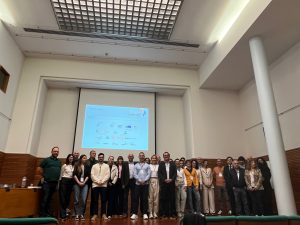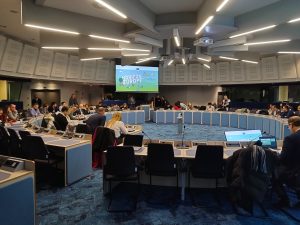[vc_row][vc_column][vc_column_text css=”.vc_custom_1527683961696{margin-bottom: 0px !important;}”]While new technologies and energy efficiency requirements are driving the demand for skills in the construction sector, some of its inherent characteristics, such as its low attractiveness, structural specificities and the challenges in delivering vocational education and training (VET), pose obstacles to the development of skills needed to flourish. In addition, difficulties in skill recognition across countries limit mobility among workers as a possible solution for skills shortages. This is a conclusion of the Analytical Report elaborated by the European Construction Sector Observatory (ECSO), aiming to draw a snapshot of the current skills situation in the construction sector.
The issues were subjects of discussion in the forum realized in Chania, in Chamber of Commerce and Industry conference center, with the participation of local stakeholders. In this context, the GSS CVET project was presented, by the TECHNICAL EDUCATIONAL INSTITUTE OF CRETE (TEIC), CHANIA DEVELOPMENT CORPORATION (ETAN), the ASSOCIATION OF PHOTOVOLTAIC COMPANIES IN GREECE (HELAPCO) and the EUROPEAN CENTER IN TRAINING FOR EMPLOYMENT (ECTE).
In the GSS CVET project, 16 dedicated specialized institutions, from Greece, Germany, Bulgaria, and Spain are collaborating to tackle skills shortage and skills development as a key driver for the competitiveness of the sector by improving the quality of vocational education and training (VET). The project will develop specialized training material in the solar and thermal energy sector in innovative digital teaching methodologies is offering the sector a wealth of opportunities to train and increase the level of skills of the workforce, so as to reap the benefits associated with them. The workers will have the opportunity after training to get recognition by validating the skills knowledge and competences acquired.
A qualified workforce in the sector is essential to ensure the higher levels of quality required for moving towards Nearly Zero-Energy Buildings and to accelerate the rate of building renovation in Europe. It is particularly important to train workers, as well as middle-level professionals throughout the entire building value chain, in order to address the upcoming challenges. These include new materials and technologies, the integration of renewables, and collaboration using Building Information Modelling (BIM).
The GSS CVET project is financed by the European Commission under the Sector Skills Alliances of Erasmus+ programme.[/vc_column_text][/vc_column][/vc_row]


